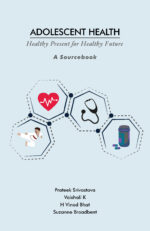Prof H Vinod Bhat is Vice Chancellor of theApollo University in Chittoor, Andhra Pradesh. He has been a medical doctor, a teacher,researcher and an academic administrator for the past 34 years, and is deeply interested in child health and public health. As Vice Chancellor of Manipal Academy of Higher Education (MAHE), he was responsible for the University being conferred the coveted tag of Institution of Eminence. He has an MD in community medicine, and is also an Honorary Fellow of Royal College of Physicians and Surgeons, Glasgow. A researcher at heart, he has several scientific publications in national and international peer-reviewed journals to his credit. He also serves on the Governing Boards and Advisory Committees of several Non-Profit organizations in the country and abroad.
-
Adolescent Health: Healthy Present for A Healthy Future. A Sourcebook
₹100.00Author: Prateek Srivastava, Vaishali K, H Vinod Bhat, Suzanne Broadbent.
Protecting and nurturing adolescents is of fundamental importance to any family. However, adolescents and parents in different communities face unique challenges in understanding adolescent health due to various factors. Despite their intention to meet the demand for a healthy adolescent lifestyle, there is a lack of resources, an increase in unhealthy eating, and negative changes in lifestyle habits. In this context, it is essential to ponder upon the question, “What does it mean to be healthy for an adolescent?”. This sourcebook provides a holistic understanding of aspects like growth, nourishment, stability in environment, overcoming emotional barriers, and providing support for mental health. It is a guide for both parents and adolescents, and approaches the foundational question from the caregiver and the adolescent perspectives. The authors sincerely believe that investing in children is one of the vital things a society can do to build a better future.
Interested readers may write to us at mup@manipal.edu about purchasing the book.
Also available on -
Internationalization of Higher Education: The Dynamics of Educational Ecology
₹500.00Editors: H Vinod Bhat, Neeta InamdarThe mobility of scholars seeking knowledge has been a part of the university ideal for centuries. History holds testimony to the fact that these mobilities have also altered the lives of people in different regions. Universities have played a pivotal role in the movement of people across borders and the resultant transformation of societies due to transcultural interactions.In this book, the editors have brought together ideas on the changing dynamics of these mobilities of scholars and the interconnectedness of higher education institutions in today’s world. An attempt is also made to record the implications of these international collaborations in knowledge generation and dissemination within the educational ecology. The notion of educational ecology is explored through the articles in the book to comprehend the power play that exists in the dimension and the direction of internationalization of higher education. All this is done with the hope that the opening up of education to global opportunities may, over a period of time, lead to equitable distribution of opportunities worldwide.Interested readers may write to us at mup@manipal.edu about purchasing the book.
International Edition available on South Asia Edition available on


